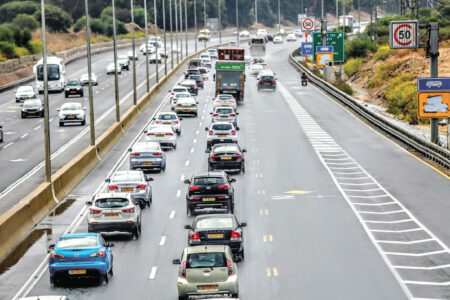For years, there have been plans to widen the Coastal Highway (Route 2), one of Israel’s most important highways, Route 2, in order to ease congestion and add lanes for buses and cars in each direction. The plan for the section between Zikhron Ya’akov and Caesarea was approved in 2016 and an initial budget of NIS 230 million was allocated out of the total NIS 1.7 billion needed. Now, just as a final signature was necessary to start the project, Finance Minister Bezalel Smotrich opposed financing, and the project was removed from the five-year road construction plan. The road was to be diverted east to a new road near Jisr al-Zarqa, on land belonging to Moshav Beit Hananiya, while a new Arab Village neighborhood would be built on the highway’s current route.
The development of the moshav is based on a highway diversion
The plan, which was approved in 2016, also includes the development of Beit Hananya, which borders the coast and the Nahal Hatninim Nature Reserve. The moshav is the second poorest socioeconomic group, according to the Central Bureau of Statistics – 26% of its residents are unemployed and the average monthly salary is only 5,767 shekels. Over the years, planning institutions have drawn up development plans for the moshav based on diverting Route 2 eastward.
Objections to the Route 2 diversion plan were examined by an external auditor. The residents of Beit Hanina claimed that the new road would harm their agricultural lands and that the problem of the expected increase in Jisr al-Zarqa could be solved within its current borders. It is also claimed that the plan would anyway require huge investments in infrastructure and homes which would render it unfeasible.
In addition, residents of the moshav said that the affected areas amounted to about 400 dunams (100 acres), that the proximity of the homes to the road would create noise and pollution risks, and that a new urban residential neighborhood would be created at the bridge. , on land vacated from the current Route 2, would harm “the quality of rural life and peace in Beit Hanania. Indeed today, their quality of life is being damaged as a result of the failed management and lifestyle of the nearby village (the bridge)”. Finally, it was argued that “the growth of the settlements must be definite and limited, especially at the cost of harming others. The residents of Beit Hanania are the second generation of Holocaust survivors who have been expelled from their homes.”
Despite the many allegations, the auditor determined that the total expropriation would amount to about 300 dunams (75 acres) out of the 2,100 dunams (525 acres) in the moshav. The moshav’s homes will be at least 800 meters from the new road, so there will be no concern of damaging the acoustics or air quality. The auditor also pointed out that the village of Jisr al-Zarqa is no different from any other village, and its expansion should be allowed even if it is at the expense of a neighboring village.
Smotrich changed the previous government’s decision
The Bennett Lapid government made the decision to strengthen Jisr al-Zarqa socially and economically and part of this was to move ahead with the plan to divert Route 2 eastward. The coastal road project has been rated as a top priority and funds have been allocated as part of the five-year road construction plan.
But in recent budget discussions between government ministries, in addition to pressure from Likud Knesset members, Finance Minister Bezalel Smotrich pressed not to provide a budget for highway expansion and conversion, and as a result it was not included in the basket of projects to be implemented over the next five years. Smotrich’s involvement is also reflected in the high rate of infrastructure development budgets in Judea and Samaria, all part of the same strategic plan.
Nevertheless, former Transportation Minister Merav Michaeli allocated NIS 230 million to promote the project by preparing the land and beginning work to expropriate the property that Beit Hanania wanted to avoid. But the entire project will cost NIS 1.7 billion and it is not clear now if it will ever be implemented.
A statement on behalf of the Minister of Finance said, “The budget agreement between the Ministry of Finance and the Ministry of Transport reflects the order of priorities, the importance and urgency of infrastructure projects in Israel, and this is what the matter will be like in the future as well.”
Published by Globes, Israel business news – en.globes.co.il – on May 11, 2023.
© Copyright Globes Publisher Itonut (1983) Ltd., 2023.
